Equestrian Freedom or Political Repression?
by
CuChullaine O’Reilly FRGS
|
Equestrian Freedom or Political Repression? by CuChullaine O’Reilly FRGS
|
|
Would you stake your life on a car?
Would you be willing to bet that your family’s safety can be entrusted to an outdated highway system which has repeatedly put millions at risk?
If a natural catastrophe were to affect your area, would you know how to make your way cross-country to safety?
Should the federal government begin to arrest political dissidents, could you escape the technological dragnet designed to silence any potential opposition?
If you answered “No” to any of those questions, then you’ve got a problem and the answer isn’t parked in your garage.
Lucky for you, history provides a surprising solution.
The Dawning of a new Age
No one realized at the time that the inaugural parades of two American presidents would have such a symbolic resonance.
William Taft was elected president in 1908 and rode to his inauguration in a horse-drawn carriage. Four years later, his successor Woodrow Wilson chose to travel the same route in an automobile.
These two journeys represented the on-coming shift of the 20th century American horse world, though few at the time realized what they were witnessing.
In 1890 millions of horses, ponies and mules were employed in America. They worked on farms aiding agriculture. They toiled in cities delivering goods and people. They strained to maintain contact with the remote parts of the country. There were an estimated 30,000 horse-drawn fire wagons alone, each of which employed at least three horses.
The United States horse population reached its peak of 21,550,000 animals in 1918.
Consequently, by the time President Wilson stepped into his automobile, equine-related occupations or services influenced the majority of American’s lives. By 1930 less than one-third of the nation’s equines remained alive.
The advent of inexpensive automobiles and tractors at the dawning of the 20th century had combined to create an unprecedented equinocide.
A Changing Society
The cycle of events shapes each generation.
As this new century began to advance experts in various fields expressed collective alarm at the manner in which children’s lives had been radically altered in so short a time.
Even before computers became common household objects, George Orwell had warned, "The trend of the age was away from creative communal amusements and toward solitary mechanical ones."
That sad prophecy has been fulfilled in homes and play grounds around the world.
In 1970 40 percent of all American children walked to school; now fewer than 12 percent do. In Great Britain the area in which children may roam without supervision has decreased by almost 90% since the 1970s. Other countries report that their children devote an average of 42 days a year online.
Change wasn’t restricted to children.
With the loss of horses as agricultural implements, allies in the theatre of war and as companions in exploration, people begin a migration away from the saddle.
As the world became increasingly mechanized, humanity’s collective horse travel knowledge was lost without a whimper. The result was the onset of global equestrian amnesia and a decline in mankind’s ancient ability to flee climatic and political disasters.
Politics and Horses
In May, 2012 I warned the public that draconian new laws which had taken effect in America placed the traditional neutrality of explorers at risk.
My article, Threats to Travel, cautioned, “The American government has announced that it can arbitrarily define as a “terrorist” any doctor or nurse who aids a wounded human. In such cases a victim’s politics overrules his physical suffering.”
I then posed the question, “If doctors can now be classified as ‘terrorists’ by the ‘land of the free,’ are explorers next?”
In the intervening years concerns about the on-going erosion of citizens’ basic rights, including the constitutionally protected right to privacy, have continued to dominate the headlines.
Yet as political upheaval increased in the United States, I devoted my time to completing the first global study of equestrian travel.
After having spent six years writing the three-volume Encyclopaedia of Equestrian Exploration, I thought I had learned all there was to know about horse travel.
Recent events in the United States proved me wrong.
Subsequent climatic and political news made me realize that I had misunderstood and under estimated the potential readership of my book.
I have since come to believe that knowing how to journey on horseback may be of more importance, to a wider section of humanity, than I had originally perceived. It’s not just explorers who need to know how to cross a potentially hostile environment in the saddle.
Like knowing how to swim, the ability to travel by horseback is one of mankind's important basic survival skills.
Disconnect with Nature
With that thought in mind, I made an investigation of various websites devoted to the theme of self reliance. Therein I found the titles of nearly 500 books which are aimed at that audience and include valuable information on everything from hunting to housekeeping. These titles prove that people have given a great deal of thought to how to hunt, clothe, feed, shelter and protect themselves.
Yet none of those authors had acknowledged how horses have accompanied and empowered our species for thousands of years. Those books did not address what happens when millions of people attempt to flee in their cars in the face of a natural catastrophe. No one had expressed apprehension that a predatory government could restrict personal liberty via the sale of gasoline or the closure of a freeway.
Mounted Champions
Whereas all of the challenges and changes I have mentioned are of grave concern, our most serious worry may be the decreasing amount of liberty which citizens face around the world.
Throughout history Long Riders have often been social dissidents. They don't like to be controlled. They are highly individualistic. They enjoy the freedom to roam at will. They aren’t afraid of speaking their mind. They are a potent symbol of personal independence, resistance to oppression and defiance of the power of the state.
Two examples spring to mind.
In the late 18th century William Cobbett was exiled from England because of his political views. Upon his eventual return in the 1820s Cobbett set out on horseback to make a series of personal tours through the English countryside. His book, Rural Rides, was an exposé which enraged the political establishment.
After spending his youth riding across the pampas of Argentine, Robert Cunninghame Graham (shown above) returned to Great Britain. There he became an outspoken Member of Parliament who supported the civil rights of workers, women and minorities. When the government suppressed the rights of free speech and freedom of assembly in 1887, Don Roberto led a protest at Trafalgar Square which resulted in him being badly beaten by the police and incarcerated in Pentonville Prison.
Tyrants and Horses
Dictators are not dumb. They read history books too. That’s why they know that there are a number of steps to be taken when one wants to assume total control; critical steps include declaring martial law, seizing control of the media, arresting opponents, spying on citizens and restricting travel.
A glance at equestrian history will provide alarming examples of how tyrants crush travel, along with a citizen’s other rights.
Totalitarian regimes have realized that horses presented a potent political threat. A tyrannical system is designed to keep people close to home, where they can be kept under tight social, political and geographic control. Horses threaten to undermine this oppression. People who can ride might travel without permission. Riding might encourage the growth of resistance. Rebellion might be spread via the saddle.
Oliver Cromwell certainly understood this. After he conquered Ireland in the 17th century, he quickly passed a law forbidding Irishmen to own a horse valued at more than £5. This instantly destroyed any hope of a mounted opposition or of travel.
Stalin was no friend of horses. After seizing control of all private farmland, his ambitious goal was to create an enormous agricultural collective. The first step was to confiscate every animal larger than a chicken. Horses were no exception. They were forcibly taken from the people and placed into state-controlled farms. In 1928 he passed a law making it illegal for private individuals to own a horse.
Nor were other dictators slow to follow this lesson.
Enver Hoxha made it illegal for Albanians to own and ride horses. More recently, the Iranian government passed a law forbidding Kurds to own and ride horses.
Controlling Pedestrians
Popular culture reflects painful lessons from our political past, as the film series, Planet of the Apes, demonstrates. If a tyrant, be he an ape or a man, wants to subjugate, dominate and control a frightened civilian population, they must be kept unarmed, on foot and under constant surveillance.
Long Riders represent an alternative to the world of urban power. They are a potent symbol of personal liberty, resistance to oppression and defiance of the power of the state.
Unfortunately equestrian emancipation is under various types of attack. For example, Panama has effectively blockaded equestrian travel between North and South America. But there are other types of governmental threats.
The City of Los Angeles is encouraging equestrians to license their animals; whereas the City of Paris has made it illegal to ride a horse within the city limits.
Another case in point is how it is illegal for people to ride on the Appalachian Trail in the United States. Even though this famous American trail was laid out in the 1930s by two horsemen, and was funded by the federal government, it is now illegal for a horseman to ride on the trail.
National and state parks in the USA are also increasingly hostile to equestrian travellers.
Riding as Resistance
Certain themes run through mankind’s history. One is the on-going struggle between authoritarianism versus individualism.
It was the Italian dictator Mussolini who said, “All within the state, nothing outside the state, and nothing against the state.”
More recently the political whistle-blower Edward Snowden warned, “It’s going to get worse with the next generation who extend the capabilities of this sort of architecture of oppression.”
Despite tyranny, suspicion, intolerance and institutional hostility, there are a few brave souls bred in every generation who will not be suppressed, dismounted or extinguished. Long Riders represent an ancient flame that endures. Yet as politicians and securocrats increase their powers of surveillance, the liberty of future generations of equestrian travellers will be increasingly threatened.
It is easy to misplace our priorities and let the trivialities of daily life lull us into forgetting how vulnerable we are. It is tempting to compromise our personal safety by maintaining a blind allegiance to technology whose flaws are consistently ignored. It is a mistake not to foresee the possible rise of a political tyrant.
We should not misplace our trust, nor forget that unless we stay alert and active, governments will become predatory, they will spy on us, they will deny us our freedoms and deprive us of our liberties – including our right to travel as, where and when we want.
While it is true that human destiny is fragile and uncertain; it is equally correct to acknowledge that the union of the horse and human carried our ancestors out of savagery through barbarism into civilization.
Social psychologists have written at length about what they term “the psychology of previous investment”; i.e. the process by which people convince themselves to remain committed to a belief system even though all available evidence demonstrates that it isn’t true and doesn’t work.
Because of its charisma and beauty mankind has embraced the horse, treating it as a universal totem with iconic power. Knowing how to travel on a horse is not a step towards the past. It is a skill that can ensure that you see the future.
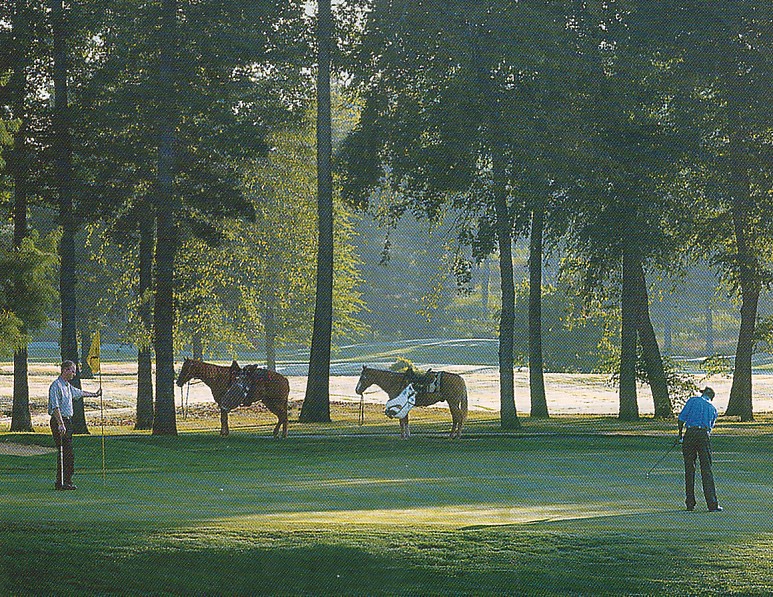
In an increasingly urbanized environment, horses became another symbol of the lavish perks and privileges enjoyed by the wealthy elite. This equestrian system was based on the extravagant consumption of energy and raw materials by a minority of individuals. Horses were not used to achieve a sense of personal geographic liberty but to define an owner’s characterization of themselves to others, in the same manner as a Hummer four-wheel-drive off road vehicle or a luxurious Mercedes Benz sports car might be. For these people, it is not where you ride, but what you own, that makes the difference. (Photo courtesy of the Long Riders’ Guild.)
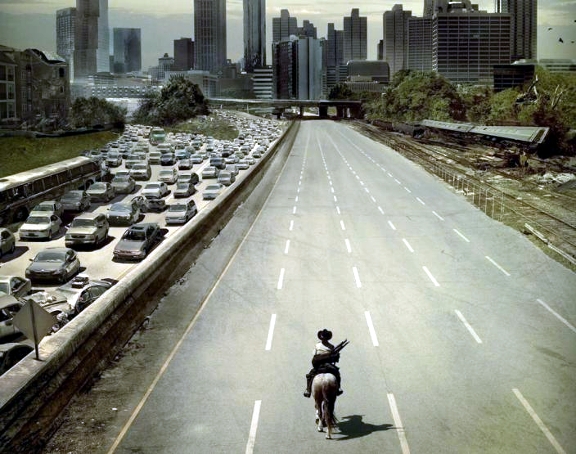
People have given a great deal of thought to how to hunt, clothe, feed, shelter
and protect themselves in the case of an emergency. Yet one of the most
critically important topics for human survival has been completely overlooked.
Like knowing how
to swim, the ability to travel by horseback is one of mankind's important basic
survival skills.
(Photo courtesy of AMC.)
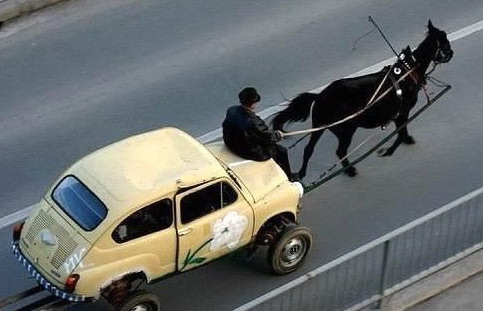
Changing times herald a shift in resource management and may result in a
re-examination of more traditional means of transportation. John Michael Greer,
the author of more than thirty books on the future of industrial society,
warned, “The more energy you need to maintain your everyday lifestyle, the more
vulnerable you’ll be to sudden disruptions when the sprawling infrastructure
that supplies you with that energy starts running into serious trouble.”
(Photo courtesy of The BBC.)
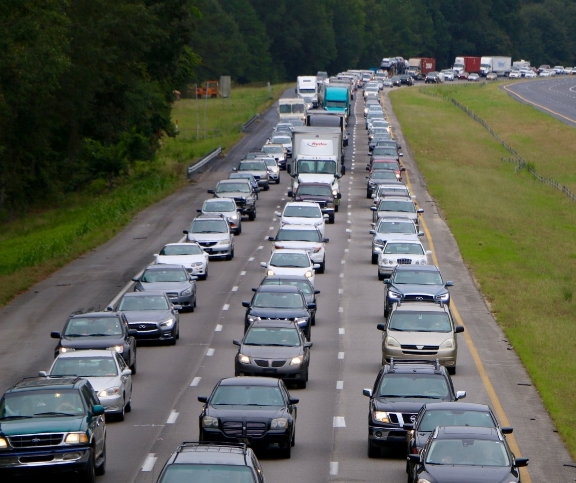
Dependence upon motor
transport and reliance upon a frail highway system is fraught with potential
disaster. When Hurricane Matthew struck in October, 2016 the government urged
two million citizens to evacuate. Thousands fled. When traffic came to
standstill outside Charleston, South Carolina, one impatient driver removed a
traffic cone and attempted to escape.
Police chased the man until he stopped on a dead-end road. Berkeley County Chief
Deputy Mike Cochran told CNN that the man fired at police officers, who shot
back and wounded the man.
(Photo courtesy of CNN.)
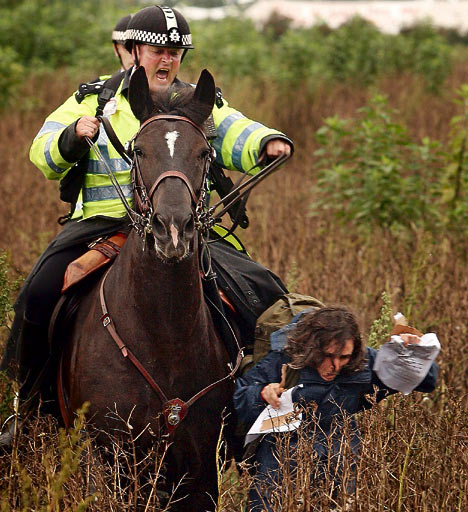
As the 20th century drew to a close, decades of increasing income came to a halt. Then a global financial meltdown and wide-spread political instability further undermined equine practices that were linked to an age based upon cheap petroleum and a wealthy middle-class. Technology has evolved in this new century but human nature has not. Predictability still means control. Authoritarian regimes continue to use horses to enforce conformity, demand obedience, suppress domestic dissent and restrict liberty of movement. (Photo courtesy of Daily Mail.)

Popular culture reflects painful lessons from our political past, as the film
series, “Planet of the Apes,” demonstrates. If a tyrant wants to subjugate,
dominate and control a civilian population, they must be kept unarmed, on foot
and under constant surveillance.
(Photo courtesy of
20th Century Fox.)
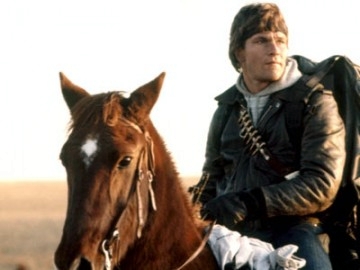
Joseph Stalin would not have approved of the 1984 film "Red Dawn," a Cold War tale that depicted Soviet, Nicaraguan, and Cuban paratroopers invading the United States. Resistance quickly spread, thanks to a group of armed teenagers, led by political rebel Patrick Swayze, who fled into the Rocky Mountains on horseback to escape capture and lead a mounted rebellion. (Photo courtesy of United Artists.)
Yet a resistance to authority is a central motif in equestrian travel history.
In the centuries since Long Riders first appeared they have worn many faces
including traveller, pilgrim and rebel. Political insurgent Robert Cunninghame
Graham was one of those who fought to maintain freedom from a repressive
government,
There are a few like him, bred in every generation, who will not be suppressed
or dismounted. Tyrants come and go. This need for liberty cannot be
extinguished.
A mounted man is a free man and a free man is a threat to a tyrant.
(Photo courtesy of The National Portrait Gallery.)
CuChullaine O’Reilly is an investigative reporter who has spent more than thirty years studying equestrian travel techniques on every continent. After having made lengthy trips by horseback across Pakistan, he was made a Fellow of the Royal Geographical Society and the Explorers’ Club.
O’Reilly founded the Long Riders’ Guild, the world's first international association of equestrian explorers. The organization has Members in forty-six countries, all of whom have made a qualifying equestrian journey of at least one thousand miles. The Guild has supported equestrian expeditions on every continent except Antarctica.
He is the author of the forthcoming Encyclopaedia of Equestrian Exploration and its companion, The Horse Travel Handbook, which is now available. O’Reilly is also the author of Khyber Knights, an equestrian travel tale which has been described as a “masterpiece” and the author as “Jack London in our time”.
Word from the Founder main page
|
|